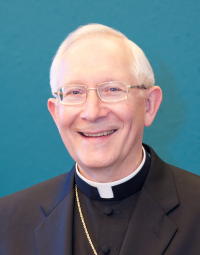
Archbishop Leonard P. Blair
As I write this article for the Transcript well in advance of its publication date, we are in the throes of the coronavirus crisis, and I don’t know where we will be by the time you read this. Whatever the situation, this crisis is a reminder that we and all our medical and scientific progress to date are not invincible. And if, as we all hope, a medical remedy can soon be found, we will still always be mortal beings, fragile creatures in the immensity of a created universe that is beyond our grasp.
God is the Creator and we are his creatures. We are made for love in the divine “image and likeness” with a rational and immortal soul and redeemed by the blood of God in the flesh, Jesus Christ, but creatures nonetheless. Such is the nature of love that there can be no authentic “yes” without the possibility of also saying “no.” Adam and Eve said “no.” Jesus and Mary said “yes,” and made it possible for us to say “yes” but the freedom is still ours.
God is revealed in the Old Testament as the Lord of history. The story of the exodus shows how God’s people were called out from bondage, out into a high-risk situation in the desert, totally dependent on God alone. The whole history of Israel is the story of a people being led by the hand of God. Their infidelity, which at root was a lack of trust, was denounced by the prophets, who recognized the true depths of human sinfulness and the need for God himself to create a trusting human heart in a new covenant yet to come. This was fulfilled with the advent of Christ.
Like our spiritual forebears in the desert, we, as fallen creatures, find it difficult to live with complete trust — not only that God exists, but that we are totally dependent on him for all that we are and all that we have. In the words of Pope Benedict XVI: “The human being does not trust God … He harbors the suspicion that, in the end, God takes something away from his life, that God is a rival who curtails our freedom, and that we will be fully human only when we have cast him aside … The human being lives in the suspicion that God’s love creates a dependence and that he must rid himself of this dependency if he is to be fully himself.”
Our former Holy Father goes on to say: “Love is not dependence but a gift that makes us live … We live in the right way if we live in accordance with the truth of our being, and that is, in accordance with God’s will.” (Homily, Dec. 8, 2005)
Today, there is an ever greater blindness to “the truth of our being” and an ever greater desire on the part of many to “rid the world of dependency on God” and to live as if God does not exist. Even a devastating pandemic is unlikely to shake the prevailing ideologies. I’m referring to the moral relativism that most people live by today that rejects any claim to absolute truth from God that can be known by faith — or even by reason. The result is a slide into moral chaos regarding respect for life, sexuality, marriage and even the very identity of man and woman. Then, there’s the materialism that often dictates the priorities in many people’s lives, making material success an all-consuming passion, rather than trust in divine providence and “treasure in heaven.” And secular humanism offers the promise of a full, satisfying and ethical life without God or revealed religion, sometimes with a hodgepodge of practices derived from various religions or beliefs.
As epidemics remind us, we are all mortal. And as such, we need to heed the First Letter of John, who tells us that “all that is in the world — human nature full of desire, eyes hungry for all they see, material life that inflates self-assurance — does not belong to the Father; all that belongs to the world. And the world is passing away with all its desires; but the person who does the will of God remains forever.” (1 Jn 2:16-17)
